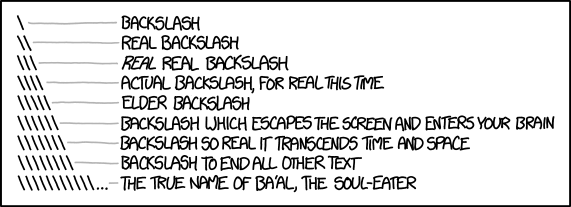GSH is an implementation of a POSIX shell developed for the Windows platform.
The aim of the project is to provide an efficient UNIX shell instantiation for Windows, for non interactive usage.
GSH can be used to compile projects depending on autotools, UNIX make,... As it targets specifically Windows platform, GSH differs significantly from the most used ones such as bash, zsh. Among others, its implementation does not depend on the 'fork system call' and doesn't emulate that system call (as it's done on Cygwin). This allows better compiling performance (the build times can be up to 3 or 4 times faster than builds performed by projects such as Cygwin).
Image from XKCD
Run:
$ make
$ make install PREFIX=<target directory>
Alternatively to just compile the gsh binary you can do:
$ gprbuild -p -P posix_shell
Currently the main goal of the project is to speed up builds of GNU projects on Windows platform. As the project is still not complete you still need a Cygwin installation for the tools not provided by GSH. The only requirement is that the build should be done in a path for which Cygwin path maps directly to a Windows path. For example if you do your build in c:/MyBuilds then in Cygwin the path should map to /MyBuilds.
An example of build sequence that does not destroy your current Cygwin environment:
$ (export PATH=$GSH_INSTALL_DIR/bin:$PATH;
export SHELL=$GSH_INSTALL_DIR/bin/gsh;
export CONFIG_SHELL=$GSH_INSTALL_DIR/bin/gsh;
$CONFIG_SHELL/configure --prefix=/myinstall_dir
make)
All files are provided under terms of the GNU General Public License version 3.
The project includes fragments of other projects with licenses compatible with the GNU General Public License version 3:
src/readlinecontains the source of the GNU readline librarysrc/gnulibcontains part of the GNU Portability Librarylua/srccontains the sources of Lua 5.2gnutoolscontains some executables from GNUWinos/src/ddkcontains the DDK part of the mingw-w64 project
